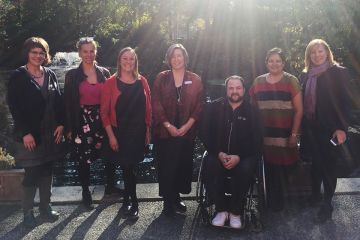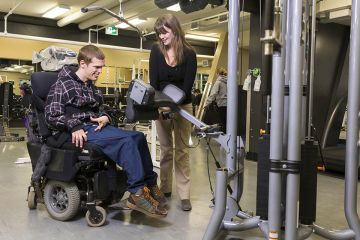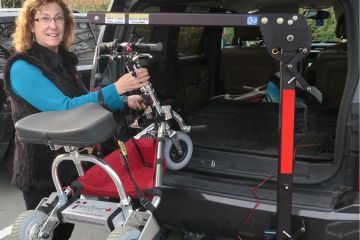CanAssist team wows BC Legislature crowd
- Valerie Shore
Several BC cabinet ministers, MLAs and senior public servants were discreetly wiping tears from their eyes on May 8 after a moving demonstration of how the University of Victoria’s CanAssist program is making a real difference in the lives of people with disabilities.
The setting was a small reception hall in the BC Legislature and the occasion was the announcement of a $3-million grant for CanAssist from two BC ministries—Employment and Income Assistance, and Advanced Education. The funding will be used by CanAssist to meet growing client demand for specialized technologies and services and to expand its operations and long-term research activities.
“CanAssist is a leader in providing innovative technology to British Columbians with disabilities, helping them with everyday activities from riding a bike to using a computer,” said Claude Richmond, minister of Employment and Income Assistance. “We want to help CanAssist build on this success.”
CanAssist is a disabilities assistance program at UVic that blends research and technology development, skill-building and job training, education and awareness, knowledge transfer, and community engagement and service. It is unique in North America.
A highlight of the grant announcement was a short speech by CanAssist client Dan Spelt, a student at Pacific Christian School who has cerebral palsy. Spelt is wheelchair-bound and has limited muscular and verbal abilities. He wants to study computer science after high school, but is unable to type with his fingers.
Working with Spelt, the CanAssist team has developed an adjustable stand for his keyboard so that he can type with his mouth. They are also working together on an onscreen keyboard system that uses word prediction to allow faster and more accurate typing.
Unfazed by the large crowd standing in front of him, the 18-year-old slowly and deliberately described in his own voice how CanAssist has changed his life. For the benefit of the audience, his words were projected onto a nearby screen and UVic graduate student Leo Spalteholz assisted with part of the text.
“I use my upper lip to operate my keyboard and so accessibility is very important for me,” Spelt told the hushed room. “I hope to have lots of time at CanAssist to fulfill my dreams and help others.”
Spelt’s determination to express himself drew a long round of applause (and the watery eyes mentioned at the top of this story). Later, ministers Richmond and Murray Coell (Advanced Education) helped demonstrate the CanAssist-designed onscreen keyboard. And CanAssist technical coordinator Sunny Mahajan demonstrated how it can be operated using electrical signals generated by facial muscle movement.
“Through CanAssist, the accomplishments of Spelt and others with special needs are not just recognized, but celebrated,” said Nigel Livingston, the program’s founder and director.
“What touches me most about the bright and motivated people in our program is not just their extraordinary ingenuity and creativity, or their dedication and the immense pride they take in their work. It’s more than that,” he said. “They invariably describe their activities and responsibilities in terms of the people they help. They care deeply about making a difference to someone’s life. That’s a truly wonderful thing.”
In this story
Keywords: CanAssist, research, disability




